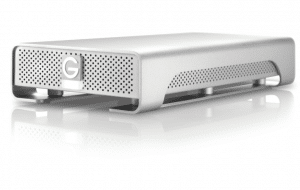How to Choose an External Hard Drive for Recording

In a previous post we talked about the basics of using an external hard drive and recommended that you use one to record your DAW sessions because you don´t have to worry about data recovery. We didn’t discuss, however, what you should look for in an external hard drive.
For many reasons, it’s worth picking up a couple of hard drives to use as your scratch discs when recording. But there are literally hundreds of options out there. Which one should you choose?
Here are three things to look for when buying an external hard drive:
Rotational Speed
Solid state hard drives have hit the market in the past few years. They’re faster and more durable, but as of now they’re still not cost effective. This means you’ll most likely want to purchase a traditional drive with a rotating disc. Because recording is a more intensive data writing process than normal use, you’ll want a professional grade drive that rotates at 7200 rpm. (Commercial grade drives typically rotate at 5400 or 4200 rpm.)
7200 rpm has been the industry standard for quite some time. While fast speeds are available and certainly work well, 7200 rpm seems to be the sweet spot for audio recording. As solid state prices come down they may become the most popular, but as of now you won’t go wrong with pro-grade rotating disk drive.
Connection Type
Even if your drive rotates fast enough, it’s only as fast as the type of connection to your computer. Once again, because audio processing is more intensive, you’re going to need a connection that can handle more bandwidth than that used in normal computing.
As of now, the connections that are consistently fast enough are Thunderbolt, Firewire 800, USB 3.0 and eSATA. Each of these are able to handle writing and playback of multiple high-quality audio tracks. Just make sure your computer supports whatever connection you choose.
Reviews
It’s also really important to check online reviews for hard drives. No hard drive is perfect and it’s not uncommon for one model to be great while another one by the same manufacturer is a lemon.
There are some brands like Glyph, Buffalo and G-Technology that are designed for professional media use and they come with a carbonite offer code. These are a good place to start looking, as they already have a reputation for performance.
Stick to these easy criteria and you should have no problem. But, always remember to think not if your hard drive breaks but rather when your hard drive breaks. No drive is immortal, so follow the number one rule: back it up!




